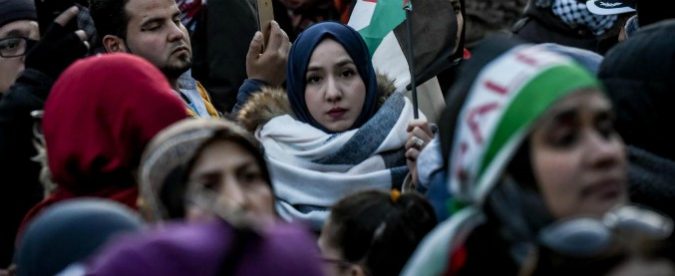“She lives here, yes”, said a baker. “Go down the street, and turn right. And ask again.” Then he said: Wait. And he filled up a bag with cookies. He said: Tell her: It’s from Hassan. “Yes, she lives here,” a greengrocer said down the street. “Go straight on till the red car, and ask again,” he said. And he handed me some pomegranates. Tell her: It’s from Shawan, he said. At the red car I turned right, then right again, then left. And I got other cookies, dates. Lemons. Because here, everybody knows Khadija Kwheis.
Everybody but Western journalists.
And everybody has words of praise for her, a display of affection.
I’ve never seen any one held in such high regard, here. Quite the opposite. Palestinians are against each other now, they speak behind their backs all the time, pick apart everything and everyone – sometimes, you have to remind them to talk a bit about Israel, too. About the occupation. Those who have power, have respect, yes, but it’s just a semblance of respect, just a formality, because it all works through intercessions and favours, through Hamas and Fatah, that rather than political movements, look like patronage networks; it is not respect, it is deference.
Except that for Khadija Kwheis.
And yet, her name says nothing to us.
Because she is an activist, true. But she is an Islamist.
She lives in Jerusalem, and her ideas are as hardcore as the occupation, that here, in what Israel views as its eternal capital, united and undivided, is harsher than anywhere else. According to the UN Partition Plan, Jerusalem was supposed to be an international city, neither Arab nor Jewish. Then, in 1948, it ended up split into an Israeli West and a Jordanian East. In 1967, Israel took over the Jordanian half as well, and in 1980, it extended to the entire city its national legislation. Not its citizenship, yet: still today its 330,000 Palestinian inhabitants, 37 percent of the overall population, have simply an ID, a residency permit that can be revoked at any moment. They pay taxes like all others, but only 10.1 percent of the municipal budget is spent in their areas: only 52 percent of their houses is connected to water mains. A number of laws and decrees aim basically to make their life illegal, and force them away. And sometimes, it is a battle building by building: sometimes settlers get in, and stay. For Khadija Kwheis, there is only one solution: the Hezbollah model. That is, war.
And that’s why for us, for Western journalists, she doesn’t exist.
Now we are all here for Ahed Tamimi, the 16-year-old in jail for slapping a soldier. Because we prefer smacks to wars, of course. But also because she is blonde. And with no hijab.
Also because she is so similar to us.
And it’s always like that. Here as in Egypt, Iraq. Tunisia. We interview only secular activists. Only peaceniks. Only those who speak fluent English, who studied in Europe.
We talk only with those who are easy to deal with.
Whose views don’t challenge ours.
And we don’t understand anything of the Middle East.
Articolo Precedente
Ferrari 488 Pista, la stradale da corsa che mancava debutta a Ginevra – FOTO






